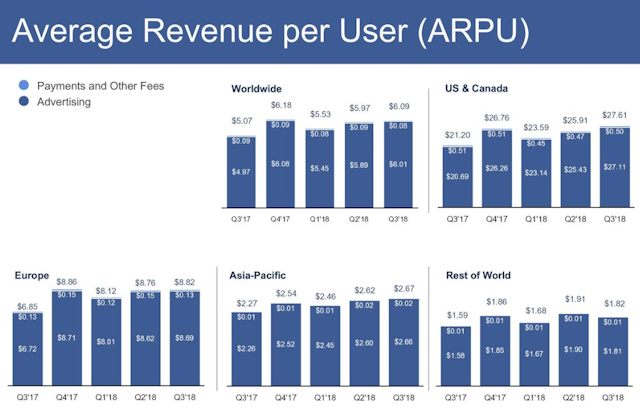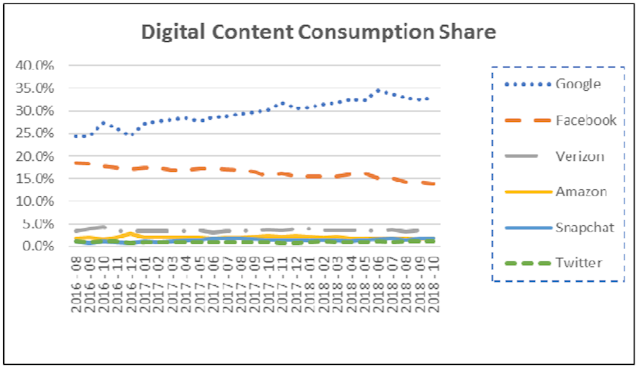Why 2019 will be Facebook’s year of reckoning – and how it can fix it
Facebook’s stock peaked at $218.62 on 25 July 2018. It will never reach that height again.

/ Photo by Thought Catalog on Unsplash
The social network will see declining growth rates – if not an outright downward trajectory – this year unless it makes two specific and significant changes.
The financial reasons
Take this slide from Facebook’s latest earnings report from Q3 2018 (the full deck is at Seeking Alpha).

Sure, the total number of daily active users (DAUs) is increasing. But look more closely. The number of US and Canadian DAUs has remained flat for a year. Growth has stopped. In Europe, the number has declined since January 2018. DAUs are growing only in other parts of the world.

Average revenue per user is more than $27 in the US and Canada and almost $9 in Europe – all places where usage has stopped growing or declined. Where Facebook use is increasing, the ARPU is $2.67 at most.
The decline in rich, developed countries and growth in poor, developing countries does not bode well. Squeezing more and more ad clicks out of rich westerners will only work for so long because ad blocker use is increasing.
Further, Pivotal Research Group in the US shared with me a December 2018 report based on Nielsen Digital Content Ratings data showing that the digital content consumption share of Facebook (including Messenger) is continuing to decline.

No matter how many in the third world start to use Facebook, their added value will never replace that of the now-stagnant first world – especially if China continues to block the platform.
The regulatory reasons
In a CNN opinion column last week, former New York assistant attorney general Sally Hubbard wrote that “Big Tech is violating the Sherman Act of 1890,” which aimed to break up monopolies in industries such as oil and railroads.
If antitrust regulators turn their attention towards Facebook, we could see Instagram and WhatsApp become separate companies. After all, tech companies are a collective oligarchy because of a lack of government oversight since the 1990s. But even then, the US government sued Microsoft for anti-competitive behaviour after the company exclusively promoted the Internet Explorer web browser in Windows computers.
Something similar could happen today. The US is looking into Facebook’s privacy issues, and the FBI has been investigating the company’s data breaches. The network could face a multi-billion dollar GDPR fine. A Canadian parliamentary committee wants the government to regulate Facebook. An Australian anti-competition watchdog will reportedly crack down on the social network. Individual states in Germany want to force Facebook to remove hate speech. An EU parliamentary committee wants to audit the company.
In addition, everyone except Facebook recognises that the company is both a media company and a tech company. I call Facebook a company that uses technology to build novel media platforms. (Just see a recent New York Times report on its “secret rulebook for global political speech.”) Media companies are liable for what they transmit – and even Facebook might not be able to afford the consequences.
It is simple maths to know that companies facing no regulation will have higher profits than when they must deal with government interventions. Lawyers cost money. Lobbyists cost money. Compliance costs money. Court and regulatory judgments cost money. These will all decrease profit margins – if not lower profits as a whole.
“Facebook is going to be forced to correct its approach to the GDPR,” Brave Software chief policy and industry relations officer Johnny Ryan told me in a prediction for 2019. “Many users have complained to regulators about its approach to consent, and these will work their way through the system. Facebook may be forced to delete user data or stop using user data for ad targeting.”
This year will also reveal what Damian Collins, the chair of the Culture, Media and Sport select committee of the UK’s House of Commons, will do following Mark Zuckerberg’s no-show during his recent investigation into fake news by a "grand committee" of lawmakers from nine countries.

Zuckerberg was perfectly willing to appear before US legislators – many of whom are elderly and think the internet is a "series of tubes". But he was conveniently unable to travel to the grand committee or UK parliament to answer tough questions from people who know what they’re talking about.
That is how you look like a coward and lose all moral authority. In 2019, I expect that Zuckerberg will be subpoenaed to appear before the British parliament – if not others as well. The opposition Democratic Party now controls the US House of Representatives, so I would not be surprised if they also open an investigation into Facebook and the 2016 presidential election.
The moral reasons
The moral degradation does not stop at snubbing governments. Last year, Guardian reporters Carole Cadwalladr and Emma Graham-Harrison broke the news that Cambridge Analytica had harvested 50 million Facebook profiles to build a software program for influencing elections. Cadwalladr also tweeted that Facebook had threatened to sue the day before publication.
At a later event in New York City, Facebook’s head of news partnerships, Campbell Brown, said that the threat was “probably not our wisest move”. No shit. You know the best way to look guilty and inspire countless other journalists to investigate you? Threaten to sue a media outlet.
Just a few weeks ago, the New York Times reported that Facebook’s crisis PR activities included the hiring of Definers Public Affairs, a sleazy political firm that does opposition-style research for corporate clients. Definers allegedly cast George Soros – a longtime target of shadowy, anti-Semitic conspiracy theories – as the force behind the growing anti-Facebook movement.
On 15 November, Facebook chief operating officer Sheryl Sandberg wrote this: “I did not know we hired them or about the work they were doing.” On 21 November, Sandberg changed her story: “Some of their work was incorporated into materials presented to me and I received a small number of emails where Definers was referenced.”
There is a word for that: lying. One of the best ways to lose all credibility with reporters is to lie. (You would think a top comms executive would know that.) Sure, we expect publicists to spin events, evade questions, and omit facts – but knowingly stating what is untrue is beyond the spokesperson pale.
The most valuable resource in Silicon Valley is not VC money but software engineers. Two days before Christmas, Tim Fox tweeted that he was quitting such a job at Facebook: “A significant part of the decision is due to my unease at working for a company that I think has lost its way and no longer lives up to its ideals.”
The tweet was largely met with applause and came amid constant reports of Facebook employees calling former colleagues for tips on jobs elsewhere, becoming less optimistic for the future of the company and hoping for a change in top leadership similar to what happened to former Uber chief executive Travis Kalanick.
The business reasons
I, for one, will never trust Sheryl Sandberg again. And the scandals are taking a toll on Facebook’s most important audience as well – advertisers. In late December, a NBC report in the US found that they are increasingly wary of the platform.
Here are a few excerpts:
- Mat Baxter, global chief executive of ad agency Initiative: "It’s about time we take a collective stand against the egregious behavior of Facebook. Hopefully, when they feel the pain of lost advertising dollars things might just change.”
- Jim Helberg, chief media officer at RPA Advertising: “If this was not Facebook but a standard bearer like a network, there would have been a much more rapid route to conclusion. Credibility and trust are paramount.”
- Rishad Tobaccowala, chief growth officer at Publicis: “Now we know Facebook will do whatever it takes to make money. They have absolutely no morals.”
The problem for marketers is not only brand safety. Facebook has essentially become an overrated, self-service junk mail platform. In December, Ebiquity’s head of international effectiveness, Mike Campbell, delivered a talk on media metrics at Mediatel’s Future TV Advertising Forum in London.
Here was one of his most important points (Ebiquity sent me the full presentation, which I have uploaded here):

Nutshell: only 0.67% of Facebook advertising impressions in this study – 35,000 out of 5.26m – were quality enough to build brands. Further, can marketers be blamed for any scepticism when Facebook allegedly inflated video ad views by up to 900% and wrongly encouraged publishers to “pivot to video”? This is amateur hour, people.
We have nothing to fear but Facebook itself
The biggest moral failing has been Facebook’s effect on society itself.
Donald Trump would not be the "illegitimate" president of the United States if Facebook did not exist. An illegal, last-minute Brexit ad campaign shifting enough votes to Leave would not have happened if Facebook did not exist. Paris would not have been burning if Facebook did not exist. More than 700,000 people in Myanmar would not have been raped, murdered or ethnically cleansed if Facebook did not exist, according to The New York Times report. I could go on.
I hope an angel trying to get its wings showed that to Mark Zuckerberg last month.
Now, the obvious counterpoint is that communications channels should not be blamed for how people use them. After all, propagandists have always used print, radio, and television. But traditional media neutrally transmits whatever is sent. Facebook itself is biased.
The network’s algorithms automatically spread whatever gets the most engagement by being the most provocative – and posts that are far left, far right, racist, sexist, political propaganda, or self-reaffirming conspiracy theories naturally do better than boring, centrist material.
Algorithms – as University College London mathematician Hannah Fry has stated – are just someone’s opinion written into code, so Facebook is intentionally spreading whatever is inflammatory. And the flames are burning higher and higher.
One recent example. A false report stating that US speaker of the house Nancy Pelosi had agreed to Donald Trump’s southern border wall in exchange for a gun ban received 20 times the Facebook engagement as a Snopes article debunking the claim. Such material is poisonous for democracy. But Facebook simply cannot afford to pay enough people to check every single questionable activity – even child pornography rings in WhatsApp groups – without likely going bankrupt.
Mark Zuckerberg's dream has always been to “connect the world.” Well, we can always use email, Skype or countless other mediums. Hell, even telegrams still exist. Facebook’s switching cost is practically zero.
The world does not need Facebook and would be better off without the social network – at least as it stands today. The cons vastly outweigh the pros. To quote Erika Hall, co-founder of the San Francisco strategic design consultancy Mule: “You know what's cooler than a billion dollars? A healthy, functioning society.”
What Mark Zuckerberg should do
A disclosure. Facebook hired me to keynote three advertiser events in Argentina, Colombia, and Mexico in early 2017. My career as a marketing speaker does not affect this column in any way, but I will state that I found the staff in those countries to be as friendly as they were intelligent.
It is the rank-and-file workers who I always support – the people who, unlike already-rich top executives, need their jobs to support their families. So, I will offer some advice for them.
The only way to save Facebook from this series of unfortunate business events is to revamp both the top leadership and the platform itself.
First, Zuckerberg needs to voluntarily sell or surrender enough of his preferred stock so that he no longer has majority control himself. He should also resign as chief executive – but remain chairman of the board – and ask the board to find a seasoned replacement. The board should also dismiss Sheryl Sandberg as both chief operating officer and board member. All of this is the only way to start to repair the PR damage. A fish rots from the head down.
Second, Facebook should follow the lead of several new media companies and move from an ad-supported model to subscription-based ones (both B2C and B2B). The problem is not the PR. The problem is the product.
Do you know what Facebook I would love? One where I simply see a feed of the posts and stories from the people who I follow in simple, chronological order. No ads. No data collection. No tracking. No marketing surveillance. No algorithms. No automation. No subconscious tricks to addict my brain to the platform. No business pages.
I would pay $5 a month for that. Maybe more, if the company would add premium B2C uses such as Facebook Watch’s streaming of Firefly and Buffy the Vampire Slayer and take market share from OTT companies such as Netflix and Amazon Prime. On the B2B side, Workplace by Facebook can compete against Slack and Yammer.
Of course, the company’s revenues and stock price would initially plummet after such major changes. But I am talking about ensuring the company’s survival for the long term – and the only way to do that is with a complete reset.
Imagine if the company cut every department related to algorithm creation, R&D, AI, personal data collection and analysis, advertising, and advertising sales. How many billions of dollars would that save? If the main income stream were simply recurring business and consumer subscription revenue, Facebook’s profit margins may even increase if the other expensive company units no longer existed.
And if personal tracking and data collection were eliminated, Facebook would spend much less money paying court fines, complying with government regulators and fighting bad actors who use the network to wreak havoc. People who had dropped Facebook out of privacy concerns may even return and becoming paying subscribers.
Mark, if you want to save Facebook from an inevitable downward spiral, now is the time to act – before it becomes the next Friendster and Myspace. Do it for the future world where your daughters will live. If you do the right thing, the stock may even surpass $218 again one day.
The Promotion Fix is an exclusive biweekly column for The Drum contributed by global keynote marketing speaker Samuel Scott, a former journalist, newspaper editor and director of marketing in the high-tech industry. Follow him on Twitter. Scott is based out of Tel Aviv, Israel.

